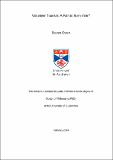Files in this item
Volunteer tourism : a path to buen vivir?
Item metadata
| dc.contributor.advisor | Laurie, Nina | |
| dc.contributor.advisor | Leahy, Sharon | |
| dc.contributor.author | Owen, Steven | |
| dc.coverage.spatial | 268 p. | en_US |
| dc.date.accessioned | 2019-04-18T15:15:03Z | |
| dc.date.available | 2019-04-18T15:15:03Z | |
| dc.date.issued | 2019-06-26 | |
| dc.identifier.uri | https://hdl.handle.net/10023/17542 | |
| dc.description.abstract | The popularity of volunteer tourism stems from its discursive positioning as fostering mutually beneficial relations between volunteer tourists and the host destination. Despite extensive scholarly work, the outcomes of this activity for host communities and volunteer tourists are still unclear. This study examines how volunteer tourism is interpreted across a range of stakeholders in two indigenous communities in Ecuador - one Kichwa community in the town of Chilcapamba and one Tsa'chila community near the town of Santa Domingo. Employing qualitative research methods of interviews, focus groups, participant observation, document analysis and diary analysis, this study makes multiple contributions to existing literatures. Through the inclusion of host community members, it provides new insights into a tourist practice, predominantly understood from the perspective of volunteer tourists from the Global North. Moreover, it provides an alternative reading of volunteer tourism by framing this activity through a worldview and political discourse originating from the Global South - Buen Vivir or 'good living'. The study argues that volunteer tourism functions through and reinforces the structures and imaginaries of an unequal and uneven global economic system. Chapter Four contextualises the study, deducing that despite using the discourses of Buen Vivir the Ecuadorian state employs practices typical of the neoliberal agenda. Chapter Five illustrates how host community members adopt and negotiate knowledge and practices from the Global North, to satisfy the demands of the volunteer tourism industry. Following this, Chapter Six argues that marginalised community members mobilise the discourses of Buen Vivir, to challenge neoliberal practices, which perpetuate existing inequalities in the communities. Finally, Chapter Seven proposes that volunteer tourists demonstrate a neoliberal subjectivity in how they manage and narrate their experience in the host communities. The study concludes that volunteer tourism embodies the spirit of neoliberal development models, whilst Buen Vivir provides a critical avenue for unsettling this agenda, by providing a framework through which alternative possibilities can be imagined. | en_US |
| dc.language.iso | en | en_US |
| dc.publisher | University of St Andrews | en |
| dc.rights | Attribution 4.0 International | * |
| dc.rights.uri | http://creativecommons.org/licenses/by/4.0/ | * |
| dc.subject | Volunteer tourism | en_US |
| dc.subject | Buen vivir | en_US |
| dc.subject.lcc | G156.V64O8 | |
| dc.subject.lcsh | Volunteer tourism | en |
| dc.subject.lcsh | Volunteer tourism--Ecuador--Case studies | en |
| dc.subject.lcsh | Well-being--Ecuador | en |
| dc.subject.lcsh | Neoliberalism | en |
| dc.title | Volunteer tourism : a path to buen vivir? | en_US |
| dc.type | Thesis | en_US |
| dc.contributor.sponsor | University of St Andrews. 600th Anniversary Scholarship | en_US |
| dc.type.qualificationlevel | Doctoral | en_US |
| dc.type.qualificationname | PhD Doctor of Philosophy | en_US |
| dc.publisher.institution | The University of St Andrews | en_US |
| dc.identifier.doi | https://doi.org/10.17630/10023-17542 |
The following licence files are associated with this item:
This item appears in the following Collection(s)
Except where otherwise noted within the work, this item's licence for re-use is described as Attribution 4.0 International
Items in the St Andrews Research Repository are protected by copyright, with all rights reserved, unless otherwise indicated.


